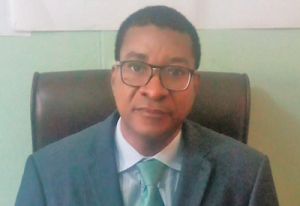Jeremy Agyemang’s Alumni Profile
he Columbia Center on Sustainable Investment (CCSI) launched an Alumni Profile Series in which alumni of CCSI’s Executive Training on Sustainable Investments in Agriculture are interviewed about their career paths.
In this profile, Jeremy Agyemang, Head of the Agribusiness Unit at the Ministry of Food and Agriculture in Ghana and a 2017 Executive Training alumnus, provides insights on facilitation of agricultural investments in Ghana and supporting agribusinesses with technical expertise.
1. What do you do for work?
I am an agricultural economist and am currently the Head of the Agribusiness Unit at the Ministry of Food and Agriculture in Ghana. My duties include facilitating agricultural investment by providing investors with the information necessary to make investment decisions. I meet with different stakeholders – including investment agencies, technical directorates, and investors – regarding the investment process, and assist investors with the general facilitation of their investment decisions. My work also involves providing capacity building to agribusinesses and supporting these business with technical expertise.
2. What does a typical day look like?
A typical day starts with responding to emails and responding to requests for agribusiness information or data. During the day, I meet with prospective investors and agribusiness operators who come to the Agribusiness Unit for a variety of reasons, including requests for information and data on commodities of investment interest, information on markets, land acquisition, support services, procedures for acquiring phytosanitary certificates to export crop produce, and procedures for exemptions on duties on imported agricultural machinery and equipment for agribusiness operations. My day sometimes includes meetings with other ministries, departments, and agencies on agribusiness related issues. Some days are devoted, with my colleagues in the Agribusiness Unit, to preparing documents on investment opportunities in the agricultural sector and commodity profiles for the benefit of the investor community. Depending on the month, I go on field visits to agribusinesses in different regions to stay up to date on the challenges agribusinesses are facing and to interact with different players in the industry, which enables me to provide feedback to the Ministry.
3. How has your career trajectory led you to where you are today?
I started my career as an Assistant Agricultural Economist working with the Policy Division with the Ministry of Food and Agriculture in Ghana, before moving into monitoring and evaluation (M&E) as an M&E officer for a World Bank project focused on improved agricultural technology generation by research and dissemination through agricultural extension. My 2 years spent on a World Bank funded project were enlightening and beneficial. The diversity of experience working in policy and monitoring and evaluation gives me a panoramic view of agriculture and has been invaluable in dealing with issues that arise in the context of agribusiness.
I came into agribusiness in 2012 when I was assigned to the newly established Agribusiness Unit. Two dynamics influenced the functions of the Agribusiness Unit. The first being the Grow Africa Initiative in 2011, which was an initiative aimed at strengthening growth initiatives in Africa and providing technical support to help African countries become investment ready. The second was the New Alliance for Food Security and Nutrition, which was a follow up to Grow Africa designed to encourage capital from international private investment to partner with local private sector in agriculture. These initiatives put agribusiness in focus and helped fashion a role for my career in agribusiness and agriculture investment.
4. What is one of your most memorable moments in your career and why?
One of the memorable moments in my career was when two years into my work at the Agribusiness Unit, my Head of the Unit was suddenly made the Director of the Policy Planning Monitoring and Evaluation Directorate of the Ministry. I was suddenly made the acting Head of the Unit, which was a high point and memorable moment in my career because it came much earlier in my career than expected. I held the position for almost a year and gained enormous management experience, which was of great benefit when I became the Head of the Unit in 2017.
5. What major issue related to sustainable investments in land and agriculture are you particularly interested in at the moment?
I am very much interested in how private investment can provide markets and commercial relationships for smallholder farmers and also enhance export logistics, infrastructure, and technology transfer.
6. What was your main lesson learned or takeaway from the CCSI Executive Training on Sustainable Investments in Agriculture? How do you apply that lesson in your work?
The CCSI Executive Training on Sustainable Investments in Agriculture was very enlightening as different facets of agricultural investment were discussed during the training. My main lesson learned was understanding agricultural investments in the context of domestic laws, contracts, and investment treaties, as well as learning how profoundly legal frameworks can impact agricultural investments in ways I has not previously known.
There is an increase in public private partnerships (PPPs) in agricultural investments, which are popping up when they get to the stage of negotiations. I can now apply the knowledge gained from the training to the negotiation stage as well as to the post-investment stage.
7. What advice would you give to young professionals in your area of work?
I would say that agribusiness, especially in Africa, is picking up steam and has great potential. It is increasingly seeing investments and it is worth pursuing as a career since it is the next big drive in agriculture in Africa.

